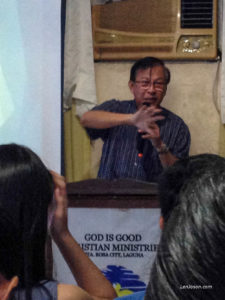The divinity of Jesus Christ has always been questioned by some people throughout the centuries. Some say he is merely human and they deny that Jesus is God. They deny that the Word who became flesh is both human and divine. There are actually many passages in the Bible that will prove that Jesus is God but in this blog, let me just focus on John 1:1-2, 14.
The Verb Form “Was”
In John 1:1-2 of the New International Version (NIV) it says: “In the beginning was the Word, and the Word was with God, and the Word was God. He was with God in the beginning.”
In this passage above, the verb form “was“ can be found four times. It is interesting to note that in Greek, this verb form is what is called an imperfect tense. It is what can be called as a “continuous tense” denoting an event or state that is continuing or ongoing. In other words we can say that: “in the beginning the Word ‘was continuously’ there.” Before there was time, the Word was already, continuously there. And the Word was continuously with God. And the Word was continuously God. That is what it is saying in Greek.
The Word “With”
Now, let’s focus on the second clause of Verse 1: “and the Word was with God.” Please take note of the word, “with” (Greek, pros) in the passage. This indicates a distinction is being made between two Persons — the Word and God. Verse 2 says the same thing: “He was with God in the beginning.”
Here is what the Bible Gateway commentary has to say: “The first verse is very carefully constructed to refer to the personal distinctness yet the essential oneness of the Word with God. To be with God means the Word is distinct from him. The word with (pros) in a context like this is used to indicate personal relationship, not mere proximity (cf. Mk 6:3). But he also was God; that is, there is an identity of being between them.”
The Definite Article “The”
The distinction becomes even clearer when we realize that in Greek there is a definite article, “the“ before the word “God.” In other words, what it is actually saying is: “and the Word was with the God.” There is clearly a distinction being made between the Word and the God. This means that before there was time, the Word was continuously with the God — the Father of course.
Verse 2 is saying the same thing: “He was with the God in the beginning.” In Greek there is actually a definite article “the“ also before the word, “God.” In other words in Verse 2 it is actually saying, “The Word was continuously with the God in the beginning.” We now know “the God” as the Father and he was with the Word (the Son) continuously before there was time.
I learned about the existence of the definite article “the” in the passage from a Greek theologian. I wouldn’t have discovered it on my own.
The Word Was and Is God
Now let’s study the last clause of Verse 1: “and the Word was God.” Please take note here that in Greek the definite article “the” is not found! This is significant. It does not say that “the Word was the God.” As we have noted, there is a distinction between the Word (the Son) and the God who is the Father.
It is very clear in Greek and most English Bible translations and Bible versions agree and render this last clause of Verse 1 as: “and the Word was God.” That’s what it actually says! And It means that the Word was divine in the same way that the Father was divine. It means that the Word was God in the same way that the Father was God. They share the same nature, the same being. The word, “God” (theos) here is a predicate noun. It describes who the subject (the Word) is. The Word was divine. The Word was God (theos)!
The Word Became Flesh
Now let’s end with John 1:14 which says: “The Word became flesh and made his dwelling among us. We have seen his glory, the glory of the One and Only, who came from the Father, full of grace and truth.”
Please take note that this verse does not say that the Word ceased to be God. Rather, it means that the Word (Logos) took on human flesh. Without ceasing to be God, the Son took on human flesh — he became flesh! Christ had two natures, human and divine, fully God and fully human in his one Person. Instead of just appearing or manifesting as a man, he actually became flesh!
Jesus did not merely just appear quickly and then vanished again. As flesh and blood he actually dwelt (“pitched his tent”) or “tabernacled” with humans! And we know him to be the Lord Jesus Christ.
There are many passages in Scripture that prove Jesus is fully God and fully human. This blog focused on John 1:1-2, 14. Hope this helps you too.
Photo credit: Google photo



